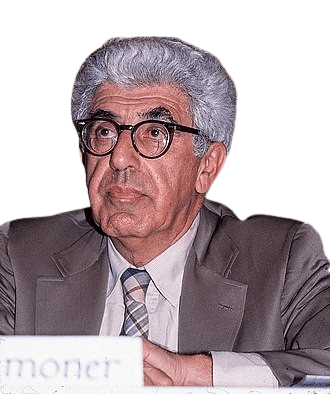Life and achievements
Early life
Barry Commoner was born in Brooklyn, New York, in 1917, to Russian Jewish immigrants. His early life was marked by an intellectual curiosity that led him to excel in school. After graduating from Columbia University with a degree in zoology in 1937, he pursued graduate studies at Harvard, where he earned a master’s in 1938 and a doctorate in cellular biology in 1941. As World War II erupted, Commoner served in the U.S. Navy, which deepened his awareness of global issues, particularly those related to resource management and environmental degradation. These experiences during the war helped shape his scientific outlook and laid the foundation for his environmental activism.
In 1947, Commoner joined Washington University in St. Louis as a professor, where he would remain for over three decades. During his time there, he became increasingly involved in public science and environmental issues. His research in the 1950s and 60s focused on the effects of nuclear fallout and industrial pollution. This culminated in his leadership role in the Baby Tooth Survey, which linked nuclear fallout from above-ground tests to harmful levels of Strontium-90 in children’s teeth. Commoner’s work played a key role in the public pressure that led to the Nuclear Test Ban Treaty of 1963, marking one of the first major victories for the modern environmental movement.
Legacy
Barry Commoner’s legacy is that of a scientist who understood the intersection of ecology, society, and economics. His groundbreaking research on the environmental impacts of nuclear testing and industrial pollution helped to usher in a new era of environmental awareness in the 1960s and 70s. His 1971 book The Closing Circle introduced millions to the idea that ecological systems and human systems are deeply interconnected. His four laws of ecology—“Everything is connected to everything else,” “Everything must go somewhere,” “Nature knows best,” and “There is no such thing as a free lunch”—became guiding principles for the environmental movement.
Beyond his scientific contributions, Commoner was an advocate for systemic social change. He believed that capitalism, particularly its focus on profit over environmental and social well-being, was at the root of ecological degradation. His vision for an eco-socialist future, where technology and industry were reorganized to support environmental sustainability, has continued to influence environmental thinking. Commoner’s involvement in politics, particularly his 1980 presidential campaign, brought environmental issues into the national conversation in ways that were unprecedented at the time.
Commoner’s impact extended beyond academia and activism; he played a critical role in the development of environmental justice. He was an early proponent of the idea that environmental issues disproportionately affect poor and marginalized communities. His work laid the foundation for the environmental justice movement, which continues to fight for equitable environmental policies today.
Milestone moments
Oct 10, 1963
Baby Tooth Survey and the Nuclear Test Ban Treaty
Barry Commoner’s research team conducted the Baby Tooth Survey, demonstrating that nuclear fallout was contaminating children’s teeth with radioactive Strontium-90.
This groundbreaking research proved a direct link between above-ground nuclear tests and the spread of harmful radioactive elements.
Public outrage over these findings played a key role in pushing for international agreements to halt nuclear testing.
The result was the 1963 Nuclear Test Ban Treaty, a major victory for environmental activists.
Apr 30, 1970
Earth Day and Environmental Awareness
Barry Commoner played a key role in the first Earth Day, a national environmental teach-in that took place on April 22, 1970.
This event mobilized millions of Americans to peacefully demonstrate for environmental reform, raising awareness about pollution, nuclear fallout, and sustainability.
Commoner's research and advocacy, particularly through his widely read publications, contributed to the growing public concern about environmental degradation.
Earth Day marked a significant moment in the environmental movement, leading to the establishment of the Environmental Protection Agency (EPA) later that year.
Jun 21, 1971
Publication of The Closing Circle
In 1971, Barry Commoner published The Closing Circle: Nature, Man, and Technology, a landmark work that articulated his four laws of ecology.
The book argued for systemic changes to the economy, emphasizing that technological and industrial practices were the primary drivers of environmental damage.
Commoner's eco-socialist perspective challenged existing environmental approaches, making the book a bestseller and a cornerstone of modern ecological thought.
Jul 30, 1980
Presidential Candidacy with the Citizens Party
In 1980, Barry Commoner ran for President of the United States on the Citizens Party platform, focusing on environmental and economic reforms.
His campaign was unique for bringing ecological issues into the political mainstream, advocating for renewable energy and criticizing corporate-driven environmental degradation.
Though he received only a small percentage of the vote, Commoner's candidacy helped frame environmental issues as central to national policy debates.
